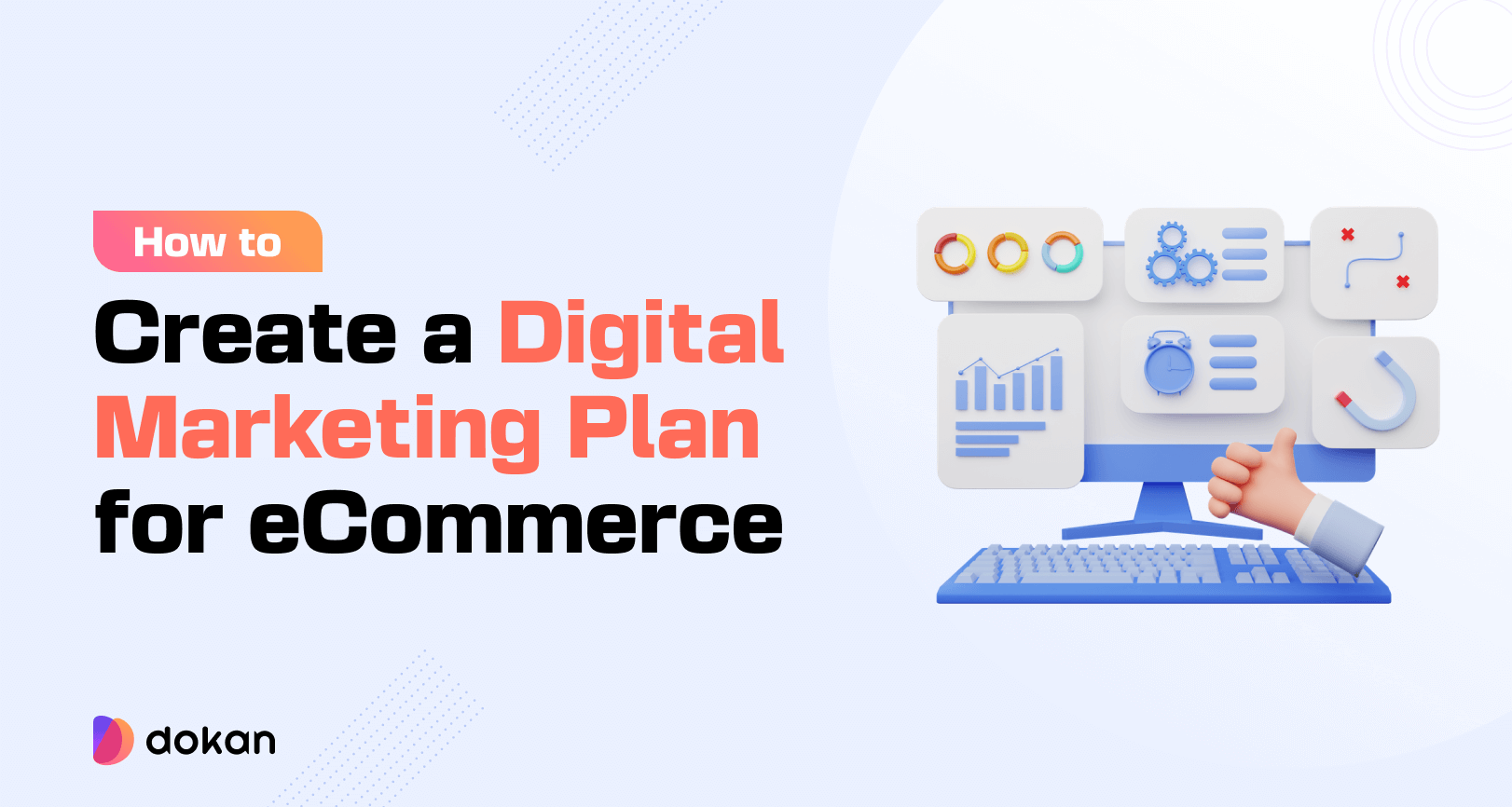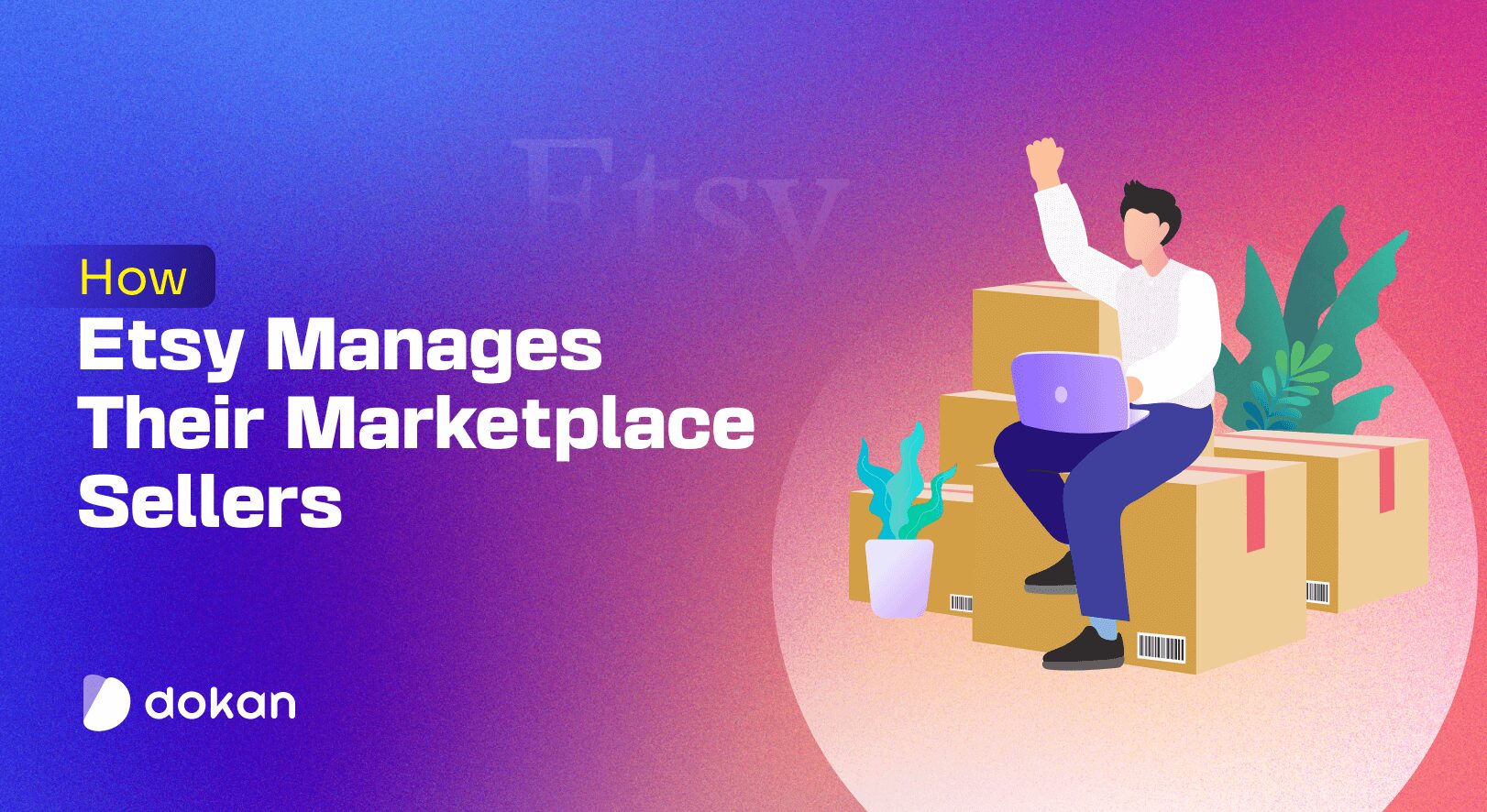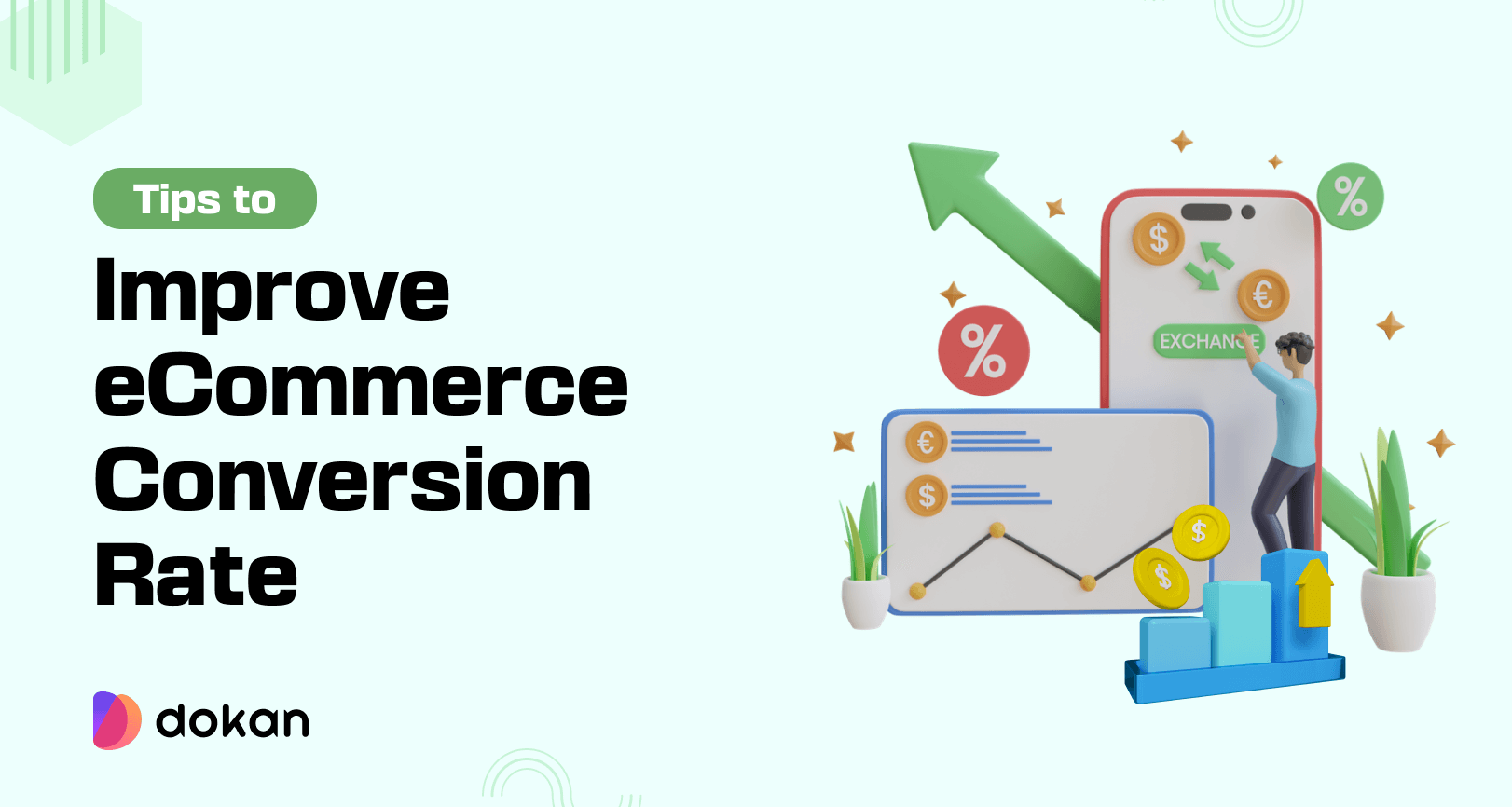Are you looking for the best eCommerce marketplace software to start your dream business? You have come to the right place.
Online marketplaces are experiencing explosive growth. With the Top 100 marketplaces, it’s projected to reach a staggering $3.832 trillion in total Gross Merchandise Value (GMV) by the end of 2024.
So, now is a great time to jump in the marketplace business wagon. With an increasing number of customers looking for the convenience of buying everything from one place, the need for a marketplace is also increasing. That is why $17 million is Amazon’s average hourly sales.
Yes, you might argue that Amazon has numerous features that make shopping convenient for customers and in order to match that, you need a lot of budget and time. But what if we tell you that there are ready-made marketplace software that will help you launch your marketplace similar to Amazon?
We are going to discuss the best multivendor marketplace software today and help you choose the one that will enable you to launch your dream marketplace like Amazon. Let’s start with-
The Concept of Multivendor Marketplace and Opportunities in 2024
A multivendor marketplace platform is essentially an online mall with many different stores. Imagine it like Amazon or eBay, where countless vendors are selling a wide variety of products all under one roof (or website). Here’s a breakdown of the concept:
- For Vendors: They benefit from a larger customer base by joining an established platform and having access to the platform’s marketing and traffic. The marketplace handles things like payment processing and customer service, allowing vendors to focus on managing their inventory and fulfilling orders.
- For Customers: They benefit from a wider selection of products and the ability to compare prices from different vendors in one place. This can lead to a more convenient and efficient shopping experience.
- For Platform Owner: The platform owner acts as the middleman, connecting vendors and customers and taking a commission on each sale.
Is it an Opportune Investment in 2024?
There are strong arguments for the continued growth of multi-vendor marketplace platforms:
- eCommerce Rise: Online shopping continues to grow significantly, and marketplaces offer a compelling way for both vendors and customers to participate.
- Wider Selection & Convenience: Customers enjoy the ease of finding a wider variety of products in one place, while vendors can expand their reach without the heavy lifting of building their own online store.
- Niche Specialization: There’s an opportunity to create marketplaces focused on specific niches, catering to a more targeted audience.
If we look at some data from the research conducted by StoreHippo–
Market Growth:
- Experts predict that by 2040, a whopping 95% of all retail sales will occur online
- ECommerce user penetration is expected to reach 48.7% globally by 2028
- The Multivendor marketplace market size is expected to reach $8.7 trillion by 2025
Customer Behavior:
- A study revealed that 75% of frequent online shoppers wish their favorite retailers had marketplaces
- A staggering 88% of consumers have at least one marketplace app on their phone, highlighting the convenience factor
However, there are also challenges to consider:
- Competition: The space is crowded with established players like Amazon and eBay. New entrants need to find a way to differentiate themselves.
- Attracting Vendors & Customers: Building a critical mass of vendors and customers takes time and effort to create a successful marketplace.
Overall, multivendor marketplaces can be an opportune investment in 2024, but success depends on careful planning, a well-defined niche, and a strong execution strategy.
List of the Best Multivendor Marketplace Software for 2024
After an extensive search and testing of numerous marketplace software, we have listed these 26 software that will help you launch your marketplace or add extra functionalities to your marketplace. They are-
- Dokan Multivendor MarketPlace Plugin
- CS-Cart MultiVendor
- Sharetribe
- Magento
- Shopify
- WCFM Marketplace
- BigCommerce
- Mirakl
- OpenCart
- WC Vendor
- MultivendorX
- Arcadier
- Marketplacer
- WooCommerce
- Nautical
- Helium 10
- Jungle Scout
- My Marketplace Builder
- Omnyfy
- SellerChamp
- Zielcommerce
- Algolia
- Auction Software
- ChannelEngine
- Vendasta
- Bagisto
Let’s see them in detail, shall we?
1. Dokan Multivendor MarketPlace Plugin
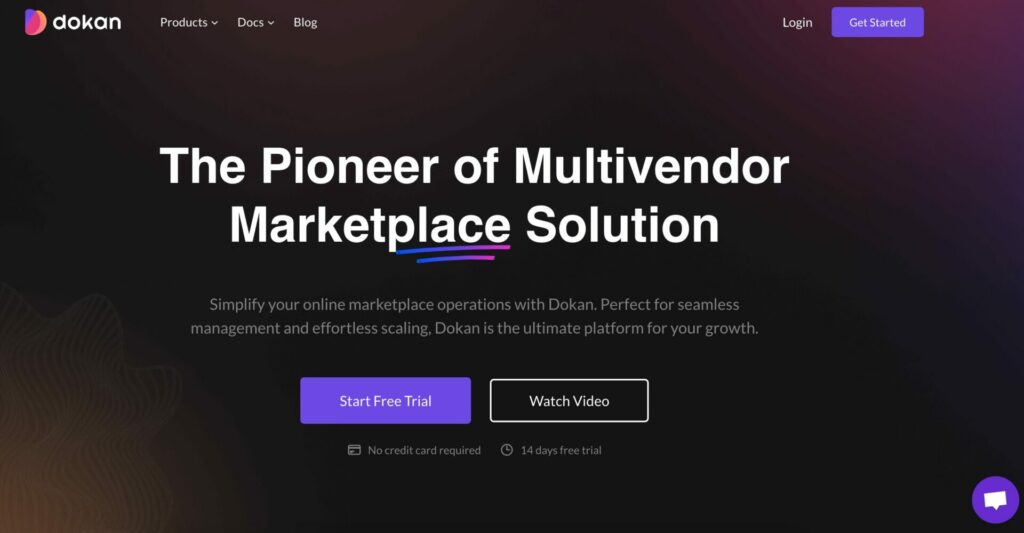
Dokan is a multivendor marketplace plugin for WordPress, powered by WooCommerce. It allows users to create and manage multivendor marketplaces, similar to eBay or Amazon. Dokan provides comprehensive tools for vendor management, product listings, and customer interactions, along with a user-friendly interface.
It supports a wide range of payment gateways, shipping methods, and customization options, making it a versatile solution for building online marketplaces.
Unique Features:
- Frontend Vendor Dashboard: Vendors can manage their own products, orders, and store settings from the frontend.
- Vendor Commissions: Flexible commission structure for different vendors.
- Product Management: Vendors can add, edit, and manage their products independently.
- Withdraw System: Vendors can request withdrawals of their earnings, managed by the admin.
- Review and Rating System: Customers can leave reviews and ratings for vendors and products.
- Earning Reports: Detailed earning reports for vendors to track their sales and commissions.
- Subscription Plans: Admins can create subscription plans for vendors with varying levels of access and features.
Pros:
- User-Friendly: Intuitive interface for both admins and vendors.
- Flexible Commission: Easy to set up different commission rates for different vendors.
- Customizable: Offers a wide range of customization options and extensions.
- Integration with WooCommerce: Leverages WooCommerce’s robust eCommerce capabilities.
Cons:
- Learning Curve: Requires some technical knowledge to set up and configure.
- Dependence on WordPress: Requires a WordPress site and WooCommerce to function.
- Cost of Add-Ons: Additional features may require paid add-ons.
Who Should Use This Software: Dokan is ideal for entrepreneurs and businesses looking to create a multivendor marketplace using WordPress and WooCommerce. It is suitable for those who need a flexible, user-friendly solution with easy-to-understand vendor management features.
Pricing: Dokan offers a free version with basic features. Premium plans start at $149 per year for the Starter plan, $249 per year for the Professional plan, and $499 per year for the Business plan.
Editors Verdict: Dokan’s frontend vendor dashboard is particularly powerful, allowing vendors to manage their products, orders, and store settings without needing access to the WordPress backend.
2. CS-Cart MultiVendor
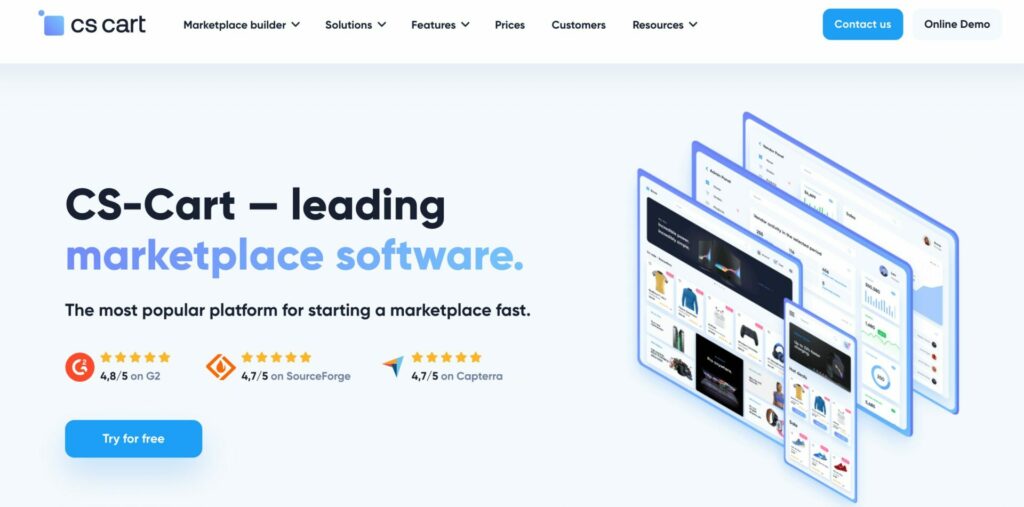
CS-Cart MultiVendor is a popular cloud eCommerce platform designed specifically for creating online marketplaces where multiple vendors can manage their own mini-stores within a larger marketplace framework.
This software provides a comprehensive solution for businesses looking to build a marketplace similar to eBay or Amazon, with extensive tools for vendor management, product listings, and customer interactions.
CS-Cart MultiVendor is known for its user-friendly interface, rich feature set, and flexibility, making it suitable for various industries and business models.
Unique Features:
- Vendor Micro-Stores: Each vendor gets their own customizable storefront within the marketplace.
- Vendor Payout System: Automated and manual payment options for vendor commissions.
- Advanced Product Filtering: Comprehensive filtering options for better product searchability.
- Vendor Plans: Different subscription plans for vendors with varying levels of access and features.
- Admin and Vendor Dashboards: Intuitive dashboards for both admins and vendors to manage their operations efficiently.
- Multi-Language and Multi-Currency Support: Global reach with multiple languages and currencies.
- Mobile App: Dedicated mobile applications for both vendors and customers for better accessibility.
Pros:
- Highly Customizable: Extensive customization options to fit specific business needs.
- Scalable: Can handle a large number of vendors and products.
- Rich Feature Set: Comprehensive tools for both vendors and administrators.
- Strong Community Support: Active community and professional support.
Cons:
- Complex Setup: Initial setup can be complicated for non-technical users.
- Higher Learning Curve: Requires time to learn and master all features.
- Costly for Small Businesses: Can be expensive for startups and small businesses.
- Add-On Dependencies: Some functionalities require additional paid add-ons.
Who Should Use This Software: CS-Cart Multi-Vendor is ideal for entrepreneurs and businesses planning to launch large-scale online marketplaces with multiple vendors. It is suitable for those who require extensive customization and scalability options, and who have the resources to manage a comprehensive eCommerce platform.
Pricing: Pricing starts at $599 for a lifetime license, with additional costs for hosting, maintenance, and add-ons.
Editors Verdict: One unique aspect of CS-Cart MultiVendor is its focus on providing a complete mobile app experience for both vendors and customers, ensuring seamless operations across all devices.
3. WooCommerce
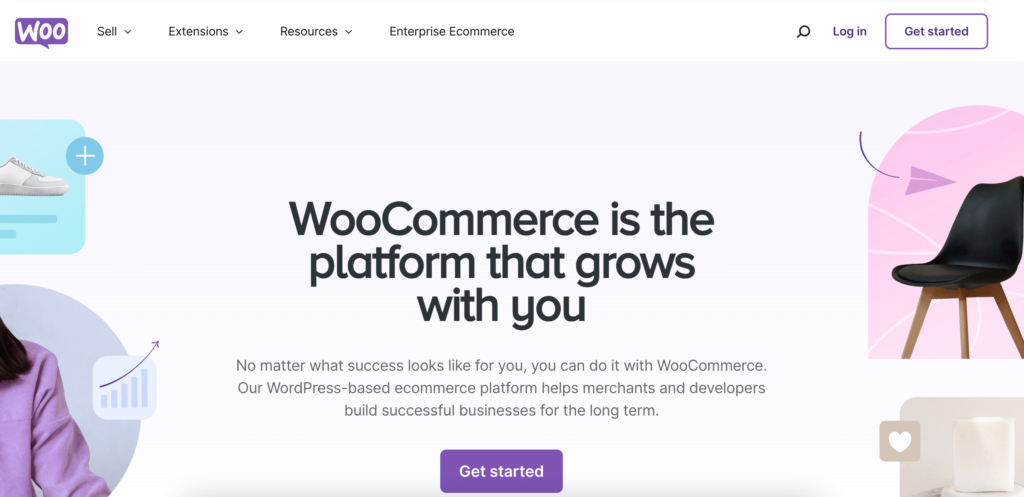
WooCommerce is a powerful, open-source eCommerce plugin for WordPress that allows users to turn their WordPress sites into fully functional online stores.
It is highly customizable and offers a wide range of features and extensions to suit various business needs. WooCommerce is known for its flexibility and extensive community support, making it a popular choice for businesses looking to leverage the WordPress ecosystem for their eCommerce operations.
Unique Features:
- Seamless WordPress Integration: Built to integrate smoothly with WordPress, leveraging its ecosystem.
- Extensive Plugin Library: Access to thousands of plugins for added functionality.
- Customizable Product Pages: Highly flexible product page layouts and options.
- Payment Gateway Support: Supports numerous payment gateways, including Stripe and PayPal.
- Shipping Options: Advanced shipping options, including flat rate, free shipping, and real-time calculations.
- Inventory Management: Robust tools for tracking and managing inventory.
- Open-Source: Fully customizable with access to the source code.
Pros:
- Flexibility: Highly customizable to meet specific business requirements.
- Cost-Effective: Free core plugin with affordable add-ons.
- SEO Friendly: Benefits from WordPress’s strong SEO capabilities.
- Community Support: Large community of developers and users for support and resources.
Cons:
- Learning Curve: Requires some technical knowledge to set up and manage.
- Performance: Can be resource-intensive, impacting site speed if not optimized.
- Maintenance: Requires regular updates and maintenance.
- Scalability Issues: May struggle with performance at a very large scale without proper optimization.
Who Should Use This Software: WooCommerce is ideal for businesses already using WordPress or those who prefer an open-source solution that is highly customizable. It is suitable for small to medium-sized businesses that need flexibility and are comfortable managing a WordPress site.
Pricing: WooCommerce itself is free, but costs can add up with premium themes, plugins, hosting, and additional extensions.
Editors Verdict: WooCommerce’s integration with WordPress means you can take full advantage of the vast WordPress plugin ecosystem to enhance your store’s functionality and marketing efforts.
Read: How to Configure WooCommerce Settings
4. Sharetribe
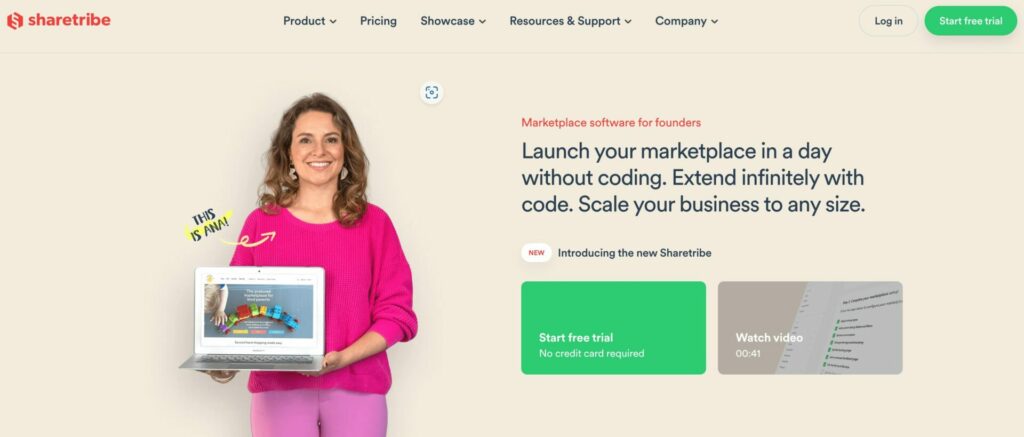
Sharetribe is a versatile marketplace platform designed to empower entrepreneurs and businesses to create their own peer-to-peer marketplaces.
It is known for its simplicity and ease of use, making it accessible even for those with minimal technical expertise. Sharetribe offers a wide range of features that help to create marketplace models, including product, rental, and service marketplaces.
It supports seamless integration and customization, allowing users to tailor the platform to their specific needs without extensive coding.
Unique Features:
- Peer-to-Peer Transactions: Enables direct transactions between users for goods and services.
- Instant Setup: Quick and easy setup with no coding required.
- Flexible Payment Gateways: Supports various payment options, including Stripe and PayPal.
- Customizable Design: Offers extensive customization options to match your brand.
- Multi-Language Support: Allows the marketplace to cater to a global audience.
- Email Notifications: Automated email notifications for transactions, messages, and updates.
- SEO Friendly: Built with SEO best practices to enhance search engine visibility.
Pros:
- User-Friendly: Intuitive interface that is easy to navigate.
- Affordable: Cost-effective solution with scalable pricing plans.
- Responsive Support: Strong customer support and active community.
- Quick Deployment: Rapid setup process, allowing marketplaces to launch quickly.
Cons:
- Limited Advanced Features: May lack some advanced features required by larger marketplaces.
- Customization Constraints: While customizable, deeper customizations might require developer assistance.
- Performance Issues: Can experience performance lags with a high volume of users.
- Dependence on External Integrations: Some features rely heavily on third-party integrations.
Who Should Use This Software: Sharetribe is ideal for entrepreneurs and small businesses looking to launch a peer-to-peer marketplace quickly and affordably. It suits those who prefer a platform that requires minimal technical knowledge and offers a straightforward, user-friendly experience.
Pricing: Sharetribe offers pricing plans starting at $29 per month for the basic plan, with higher tiers available for more advanced features and larger user bases.
Editors Verdict: One standout aspect of Sharetribe is its strong focus on community-driven support and development, ensuring that users have access to a wealth of resources and assistance from both the Sharetribe team and fellow users.
5. Magento
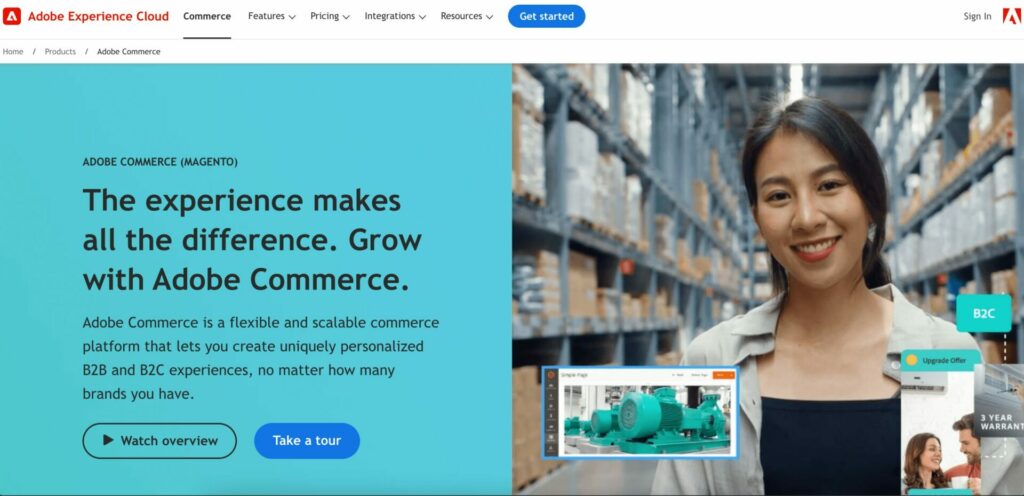
Magento, now Adobe Commerce, is a leading eCommerce platform known for its flexibility, scalability, and robust feature set.
It can create a wide range of businesses, from small startups to large enterprises. Magento offers both open-source and cloud-based solutions, providing extensive customization options and advanced capabilities for managing products, customers, and transactions.
Its powerful admin tools and strong community support make it a popular choice for businesses looking to create a comprehensive online store.
Unique Features:
- Advanced Inventory Management: Robust tools for managing inventory across multiple locations.
- Customer Segmentation: Allows for targeted marketing and personalized shopping experiences.
- Integrated B2B Functionality: Features tailored specifically for B2B eCommerce, including bulk ordering and price negotiations.
- Multi-Store Management: Manage multiple stores from a single Magento installation.
- Extensive Marketplace for Extensions: A wide range of extensions to add functionality.
- Mobile Optimization: Responsive design and mobile-friendly checkout.
- Powerful Analytics and Reporting: Advanced reporting tools for detailed insights into sales and customer behavior.
Pros:
- Highly Flexible: Extensive customization options to meet specific business needs.
- Scalable: Suitable for businesses of all sizes, from small to enterprise-level.
- Strong Community: Active community providing support, extensions, and themes.
- Comprehensive Features: Includes a wide range of built-in features for eCommerce.
Cons:
- Complexity: Can be challenging to set up and manage without technical expertise.
- Costly: Higher total cost of ownership due to hosting, maintenance, and development.
- Resource-Intensive: Requires significant server resources for optimal performance.
- Update Management: Regular updates can be time-consuming to implement.
Who Should Use This Software: Magento is ideal for medium to large businesses that require a highly customizable and scalable eCommerce platform. It suits those who have the technical resources to manage a complex system and need advanced features and integrations.
Pricing: Magento Open Source is free, but costs for hosting, development, and extensions can add up. Adobe Commerce (cloud solution) pricing depends on your requirements.
Editors Verdict: Magento’s integrated B2B functionality is particularly powerful, providing features such as bulk ordering and price negotiations that are essential for business-to-business commerce.
6. Shopify

Shopify is a leading eCommerce platform that enables individuals and businesses to create their own online stores quickly and easily.
Known for its user-friendly interface and extensive range of features, Shopify provides a complete solution for selling products online, managing inventory, processing payments, and analyzing sales data. With a vast library of apps and themes, Shopify can be customized to fit a wide variety of business needs, from small startups to large enterprises.
Unique Features:
- Drag-and-Drop Store Builder: Intuitive interface for creating and customizing online stores.
- App Store: Extensive library of apps to extend functionality and integrate with other services.
- Mobile Optimization: Responsive design and mobile-friendly checkout process.
- Multiple Sales Channels: Sell products across various platforms, including social media and marketplaces.
- Built-In SEO Tools: Optimize your store for search engines with built-in SEO features.
- Abandoned Cart Recovery: Automatically follow up with customers who leave items in their cart.
- 24/7 Customer Support: Access to round-the-clock support from Shopify experts.
Pros:
- Easy to Use: No technical skills required to set up and manage a store.
- Scalable: Suitable for businesses of all sizes, from small to large enterprises.
- Extensive App Ecosystem: Wide range of apps to customize and enhance your store.
- Reliable Hosting: Secure and reliable hosting with 99.99% uptime.
Cons:
- Transaction Fees: Additional fees for using external payment gateways.
- Limited Customization: May require additional development for extensive customizations.
- Monthly Costs: Subscription fees can be high for small businesses.
- Add-On Costs: Many advanced features require additional paid apps.
Who Should Use This Software: Shopify is ideal for individuals and businesses of all sizes looking to create a professional online store with minimal technical hassle. It is particularly beneficial for those who want a reliable, scalable platform with a wide range of integrations and support.
Pricing: Shopify pricing starts at $19 per month for the Basic plan, $49 per month for the Shopify plan, and $299 per month for the Advanced plan. There is also Shopify Plus for enterprise-level businesses at $2300 per month.
Editors Verdict: One of Shopify’s standout features is its abandoned cart recovery system, which automatically sends follow-up emails to customers who leave items in their cart, helping to recover potentially lost sales.
7. WCFM Marketplace

WCFM Marketplace is a powerful, feature-rich multivendor marketplace plugin for WordPress, built on WooCommerce. It provides extensive tools for managing vendors, products, orders, and customer interactions.
Known for its flexibility and ease of use, WCFM Marketplace allows users to create and customize their online marketplace with minimal technical knowledge. The platform supports various marketplace models, including product, service, and rental marketplaces.
Unique Features:
- Frontend Vendor Dashboard: Comprehensive vendor dashboard with intuitive controls.
- Vendor Membership Plans: Create and manage different membership plans for vendors.
- Commission Management: Flexible commission structures for different vendors and products.
- Shipping Management: Advanced shipping options, including zone-based shipping rates.
- Auction Support: Built-in support for product auctions within the marketplace.
- Chat Module: Integrated chat feature for communication between vendors and customers.
- Vendor Analytics: Detailed analytics and reporting for vendors to track their performance.
Pros:
- Ease of Use: User-friendly interface for both admins and vendors.
- Extensive Features: Comprehensive tools for managing a multivendor marketplace.
- Customizable: Highly customizable with numerous add-ons and extensions.
- Strong Community: Active community and support from the developers.
Cons:
- Performance: Can be resource-intensive, affecting site speed.
- Learning Curve: Some features may require time to learn and master.
- Dependence on WordPress and WooCommerce: Requires a WordPress site and WooCommerce plugin.
- Cost of Add-Ons: Some advanced features require additional paid add-ons.
Who Should Use This Software: WCFM Marketplace is ideal for entrepreneurs and businesses looking to create a multivendor marketplace using WordPress and WooCommerce. It suits those who need a flexible and feature-rich solution that is easy to manage and customize.
Pricing: WCFM Marketplace offers a free version with essential features. Pricing starts at $224 per year for 2 sites.
Editors Verdict: WCFM Marketplace’s integrated chat module is a unique feature that enhances communication between vendors and customers, improving overall marketplace interactions.
8. BigCommerce
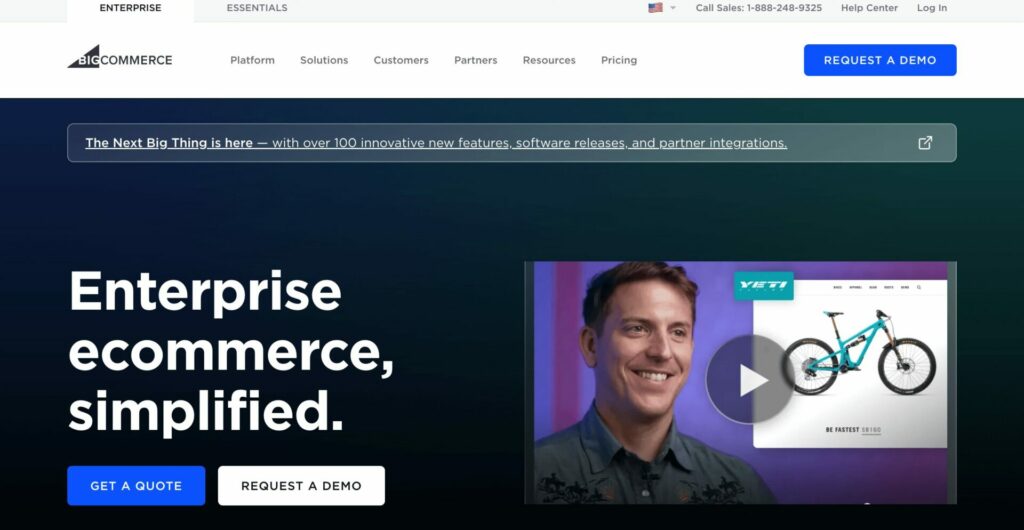
BigCommerce is a leading eCommerce platform designed for businesses of all sizes, offering a robust set of features to create, manage, and scale online stores.
BigCommerce provides powerful tools for product management, order processing, marketing, and analytics. It supports various sales channels and integrates with numerous third-party applications, making it a versatile choice for businesses looking to expand their online presence.
Unique Features:
- Multi-Channel Selling: Sell across multiple channels, including social media, marketplaces, and physical stores.
- Headless Commerce: Supports headless commerce architecture for greater flexibility.
- Built-In SEO Tools: Comprehensive SEO tools to enhance search engine visibility.
- Abandoned Cart Recovery: Automated email campaigns to recover lost sales.
- Advanced Analytics: Detailed analytics and reporting tools for performance tracking.
- Customizable Checkout: Fully customizable checkout process to improve conversion rates.
- 24/7 Customer Support: Round-the-clock support from BigCommerce experts.
Pros:
- Scalable: Suitable for businesses of all sizes, from small startups to large enterprises.
- User-Friendly: Intuitive interface with easy-to-use tools.
- Robust Features: Comprehensive set of built-in features for eCommerce.
- Strong Security: Advanced security measures to protect customer data.
Cons:
- Cost: Higher pricing tiers can be expensive for small businesses.
- Customization Limits: May require developer assistance for extensive customizations.
- Learning Curve: Some features may take time to learn and master.
- Transaction Fees: Additional fees for using certain payment gateways.
Who Should Use This Software: BigCommerce is ideal for businesses looking to build and scale a professional online store with a wide range of built-in features and robust scalability. It is suitable for medium to large businesses that require advanced tools and support for multi-channel selling.
Pricing: BigCommerce pricing starts at $39 per month for the Standard plan, $105 per month for the Plus plan, and $399 per month for the Pro plan. Custom pricing is available for the Enterprise plan.
Editors Verdict: BigCommerce’s support for headless commerce architecture provides businesses with the flexibility to create unique and highly customizable front-end experiences while leveraging powerful back-end functionality.
9. Mirakl
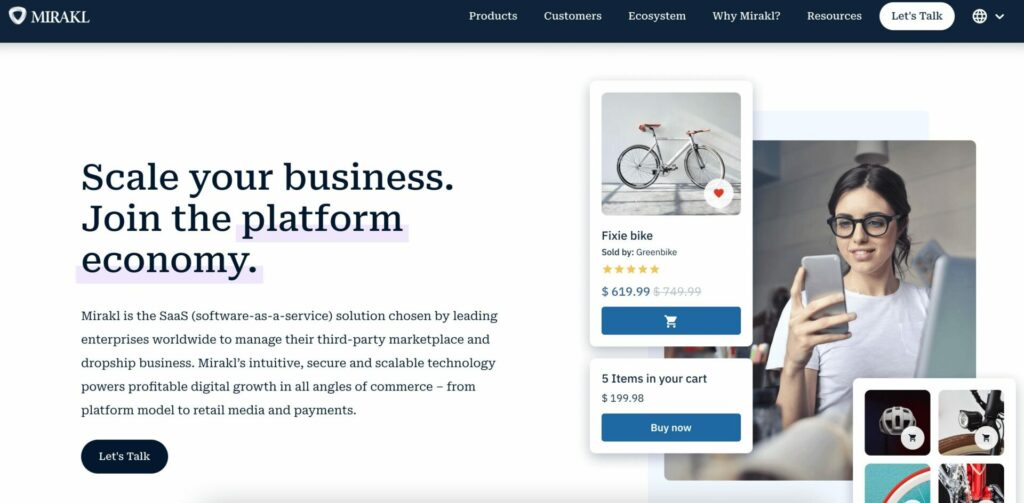
Mirakl is a leading enterprise marketplace solution that allows businesses to create and manage their own online marketplaces.
It supports both B2C and B2B models, providing comprehensive tools for vendor management, product listing, and customer engagement. Mirakl is known for its robust infrastructure, scalability, and ability to integrate with existing eCommerce platforms, making it a preferred choice for large enterprises looking to expand their online presence through a marketplace model.
Unique Features:
- B2B and B2C Support: Versatile platform supporting both business-to-business and business-to-consumer marketplaces.
- Vendor Management: Advanced tools for onboarding, managing, and monitoring vendors.
- Product Catalog Management: Centralized management of product listings across multiple vendors.
- API Integration: Extensive API capabilities for seamless integration with existing systems.
- Internationalization: Multi-language and multi-currency support for global marketplaces.
- Advanced Analytics: Detailed analytics and reporting tools for tracking marketplace performance.
- Customizable User Roles: Flexible user role management for different levels of access and permissions.
Pros:
- Scalable: Designed to handle large-scale operations and high traffic volumes.
- Comprehensive Features: Robust set of tools for managing all aspects of a marketplace.
- Seamless Integration: Integrates smoothly with existing eCommerce platforms and systems.
- Strong Security: Advanced security measures to protect data and transactions.
Cons:
- Complex Setup: Initial setup and integration can be challenging and time-consuming.
- Cost: High pricing may be prohibitive for small to medium-sized businesses.
- Technical Knowledge Required: Requires a certain level of technical expertise to manage and customize.
- Dependence on Vendor Participation: Marketplace success heavily relies on vendor participation and performance.
Who Should Use This Software: Mirakl is ideal for large enterprises and established businesses looking to expand their online presence through a scalable and robust marketplace solution. It suits businesses that require extensive vendor management tools and seamless integration with existing systems.
Pricing: Mirakl offers customized pricing based on the specific needs and scale of the business. Interested parties should contact Mirakl for a personalized quote.
Editors Verdict: Mirakl’s support for both B2B and B2C marketplaces makes it a versatile solution for businesses looking to diversify their online sales channels and cater to different customer segments.
10. OpenCart
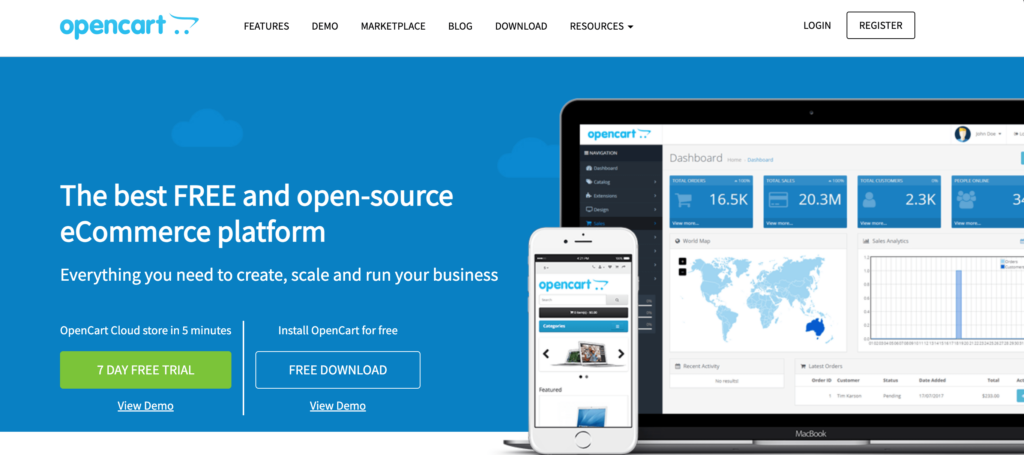
OpenCart is a popular open-source eCommerce platform that provides a wide range of features for creating and managing online stores.
It is known for its flexibility, ease of use, and extensive extension library. OpenCart allows users to customize their stores with various themes and modules, making it suitable for businesses of all sizes. The platform supports multiple languages and currencies, enabling global eCommerce operations.
Unique Features:
- Open-Source: Free to use and highly customizable with access to the source code.
- Multi-Store Support: Manage multiple stores from a single admin interface.
- Extension Marketplace: Extensive library of extensions for added functionality.
- SEO Optimization: Built-in SEO tools to enhance search engine visibility.
- Payment Gateway Support: Supports numerous payment gateways, including PayPal and Stripe.
- Shipping Methods: Advanced shipping options, including real-time shipping rate calculations.
- Multi-Language and Multi-Currency: Supports internationalization with multi-language and multi-currency options.
Pros:
- Cost-Effective: Free to use with no licensing fees.
- Customizable: Highly customizable with a wide range of themes and extensions.
- User-Friendly: Intuitive interface that is easy to navigate and manage.
- Community Support: Active community of developers and users for support and resources.
Cons:
- Performance: Can be resource-intensive, affecting site speed if not optimized.
- Learning Curve: Requires some technical knowledge to set up and manage.
- Security: Open-source nature may require additional security measures.
- Dependence on Extensions: Some advanced features require additional paid extensions.
Who Should Use This Software: OpenCart is ideal for businesses looking for a cost-effective and customizable eCommerce platform. It suits small to medium-sized businesses that need flexibility and are comfortable managing an open-source solution.
Pricing: OpenCart is free to use, but costs can add up with premium themes, extensions, and hosting.
Editors Verdict: OpenCart’s multi-store support allows users to manage multiple stores from a single admin interface, making it an efficient solution for businesses operating multiple online storefronts.
11. WC Vendor
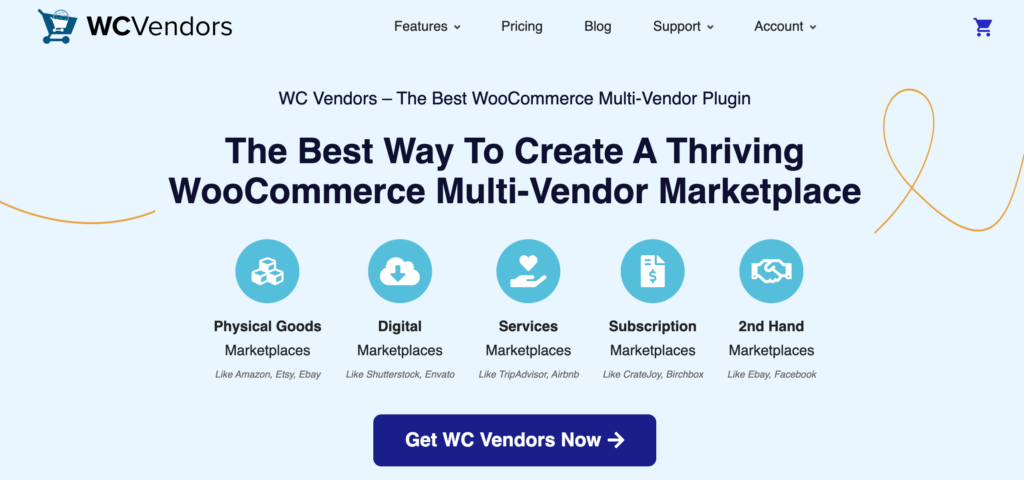
WC Vendor is a powerful multivendor marketplace plugin for WooCommerce, enabling you to turn your WooCommerce store into a full-featured marketplace. It offers a robust platform for vendors to manage their products and sales while providing comprehensive administrative control.
Unique Features:
- Customization Options: WC vendors often provide extensive customization options
- Integration Capabilities: They offer integration with various software and systems, such as ERP, CRM.
- Technical Support: Comprehensive technical support services, including 24/7 assistance.
- Scalability: Solutions that can scale with the growth of the client’s business, accommodating increased demand and expanding operations.
- Data Analytics and Reporting: Advanced analytics and reporting tools
- Compliance and Security: Adherence to industry standards and regulations, ensuring data security and privacy.
- User-Friendly Interface: Intuitive and user-friendly interfaces.
Pros:
- Efficiency Improvement: WC vendors help improve operational efficiency and reduce manual work.
- Enhanced Decision-Making: Access to real-time data and analytics aids in better decision-making and strategic planning.
- Cost Savings: Automation and streamlined processes can lead to significant cost savings over time.
- Competitive Advantage: Customizable solutions allow businesses to stay competitive by adapting quickly to market changes.
- Customer Satisfaction: Improved service delivery and customer management can enhance overall customer satisfaction and loyalty.
Cons:
- High Initial Investment: The cost of implementing WC solutions can be high, especially for small and medium-sized enterprises.
- Complexity: The integration and customization process can be complex and time-consuming, requiring skilled personnel.
- Dependency on Vendor: Businesses may become heavily reliant on their vendor for support and updates, which can be risky if the vendor fails to deliver.
- Potential Downtime: Implementing new systems or updates can lead to downtime, affecting business operations temporarily.
Who Should Use This Software: WC Vendor is suitable for WooCommerce store owners who want to build a multivendor marketplace with a strong focus on flexibility and customization. It’s ideal for those who require extensive vendor management features.
Pricing: The Pro version starts at $99.50 per year.
Editors Verdict: WC Vendor’s seamless integration with WooCommerce Bookings and Subscriptions makes it a great choice for service-based marketplaces.
12. MultivendorX

MultivendorX (formerly known as WC Marketplace) is a comprehensive multivendor plugin for WooCommerce that offers extensive features to create and manage an online marketplace.
It supports a wide range of vendor capabilities, providing a user-friendly interface for both admins and vendors.
Unique Features:
- Vendor Management System: Comprehensive tools for managing multiple vendors,
- Product Catalog Management: Centralized system for managing and updating product listings.
- Order and Inventory Management: Real-time tracking of orders and inventory across different vendors.
- Payment Processing: Integrated payment gateways that support multiple payment methods
- Analytics and Reporting: Advanced analytics and reporting tools
- Customer Service Tools: Features that support customer service, such as ticketing systems, chat support.
- Security and Compliance: Robust security measures and compliance with industry standards.
Pros:
- Customization: Highly customizable and scalable.
- Community: Strong community and developer support.
- Resources: Extensive documentation and tutorials.
- Updates: Frequent updates and new features.
- UI/UX: Vendor-friendly interface.
Cons:
- Advanced Features: Some advanced features require premium add-ons.
- Time: Initial setup can be time-consuming.
- Styling Options: Limited styling options without additional CSS.
- Cost: Higher cost for the complete feature set.
Who Should Use This Software: MultivendorX is perfect for WooCommerce store owners who want a feature-rich marketplace solution with extensive vendor management capabilities. It’s ideal for those who need a scalable and customizable platform.
Pricing: The premium version starts at $299 per year, with higher tiers available for additional features and site licenses.
Editors Verdict: MultivendorX’s vendor vacation mode feature is particularly useful for marketplaces with seasonal or occasional sellers, ensuring seamless operation during seller absences.
13. Arcadier

Arcadier is a comprehensive marketplace platform that allows businesses to create online marketplaces for goods, services, rental, and more.
It offers a wide array of customizable features and supports various marketplace models, including B2B, B2C, and peer-to-peer. Arcadier is known for its powerful admin tools and flexibility, enabling users to build and manage their marketplaces effectively.
The platform is designed to scale with businesses as they grow, making it a suitable choice for both startups and established enterprises.
Unique Features:
- Multi-Marketplace Support: Ability to create multiple marketplaces under a single account.
- Custom Code Injection: Allows for advanced customization using custom HTML, CSS, and JavaScript.
- Omnichannel Capability: Integrates seamlessly with various sales channels, including social media.
- API Access: Provides extensive API support for custom integrations and functionality.
- White-Label Solution: Offers branding customization to match your business identity.
- Multi-Currency and Multi-Language: Supports multiple currencies and languages for global reach.
- Dynamic Pricing Tools: Advanced pricing options, including discounts, promotions, and dynamic pricing.
Pros:
- Highly Customizable: Offers extensive customization options to fit unique business needs.
- Scalable: Designed to grow with your business, handling increasing users and transactions.
- Robust Features: Comprehensive feature set covering various marketplace needs.
- Strong Support: Dedicated customer support and extensive documentation.
Cons:
- Complex for Beginners: May have a steeper learning curve for non-technical users.
- Higher Cost: Can be expensive, especially for advanced plans.
- Customization Requires Skills: Advanced customizations may require developer knowledge.
- Performance: May experience performance issues with very high traffic.
Who Should Use This Software: Arcadier is suitable for businesses of all sizes looking to launch feature-rich, scalable marketplaces. It is particularly beneficial for those needing advanced customization and omnichannel capabilities.
Pricing: Arcadier has a custmised pricng plan.
Editors Verdict: Arcadier stands out with its multi-marketplace support, allowing businesses to manage several different marketplaces from a single account, which is ideal for companies looking to diversify their offerings.
14. Marketplacer

Marketplacer is a sophisticated platform designed for creating and scaling online marketplaces. It supports various marketplace models, including goods, services, and experiences.
Marketplacer provides a comprehensive suite of tools for managing vendors, products, and customers, along with robust analytics and reporting features. It is known for its flexibility and ability to integrate with existing eCommerce systems, making it a versatile choice for businesses looking to expand their online presence through a marketplace model.
Unique Features:
- Vendor Management Tools: Comprehensive tools for managing vendor applications, approvals, and relationships.
- Product Syndication: Allows vendors to easily list and manage their products across multiple channels.
- Unified Catalog: Centralized product catalog for seamless management and integration.
- Subscription Management: Supports subscription-based services and recurring payments.
- Customizable Onboarding: Tailored onboarding processes for new vendors and customers.
- Advanced Search and Filtering: Enhanced search capabilities for better user experience.
- Comprehensive Analytics: Detailed analytics and reporting for performance tracking and decision-making.
Pros:
- Versatile Platform: Supports various marketplace models and business types.
- Scalable: Grows with your business, handling increased traffic and transactions.
- Integration Capabilities: Easily integrates with existing eCommerce systems.
- Strong Vendor Tools: Robust features for managing vendor interactions and product listings.
Cons:
- High Setup Cost: Initial setup and customization can be expensive.
- Complexity: May be challenging for non-technical users to manage.
- Subscription Costs: Ongoing subscription fees can add up for small businesses.
- Dependent on Integrations: Some features rely on third-party integrations.
Who Should Use This Software: Marketplacer is ideal for established businesses looking to expand into the marketplace model. It suits those who need a scalable solution with robust vendor management and integration capabilities.
Pricing: Marketplacer’s pricing is customized based on the specific needs and scale of the business. Interested businesses need to contact Marketplacer for a personalized quote.
Editors Verdict: Marketplacer’s product syndication feature allows vendors to easily manage their product listings across multiple channels, providing greater reach and efficiency.
15. Nautical
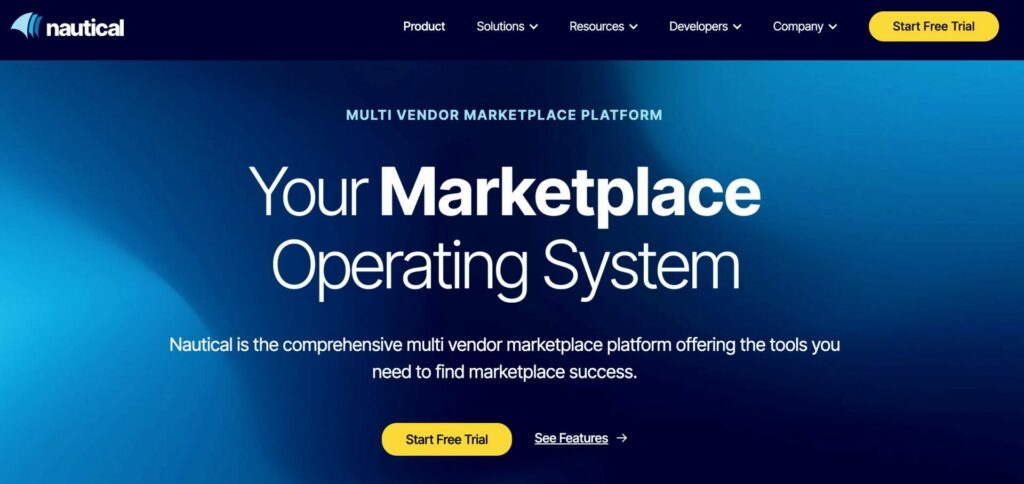
Nautical is a multivendor eCommerce platform designed to help businesses build and scale online marketplaces. It offers a wide range of features for managing vendors, products, orders, and payments, with a focus on providing a seamless and efficient user experience.
Nautical is scalable, making it suitable for businesses of all sizes, from startups to large enterprises.
Unique Features:
- Unified Marketplace Management: Centralized dashboard for managing all aspects of the marketplace.
- Vendor Onboarding: Streamlined vendor onboarding process with automated workflows.
- Order Splitting: Automatic order splitting and routing to multiple vendors.
- Integrated Payments: Built-in payment processing with support for various payment gateways.
- Real-Time Analytics: Advanced analytics and reporting tools for tracking performance.
- Customizable User Roles: Flexible user role management for different levels of access and permissions.
- API Integration: Extensive API support for custom integrations and functionality.
Pros:
- Scalable: Designed to handle growth and large-scale operations.
- User-Friendly Interface: Intuitive and easy-to-navigate dashboard.
- Comprehensive Features: Wide range of built-in tools for managing a marketplace.
- Strong Security: Robust security measures to protect data and transactions.
Cons:
- Complex Setup: Initial setup can be challenging for non-technical users.
- Cost: Higher pricing may be prohibitive for small businesses.
- Customization Limitations: Some advanced customizations may require developer assistance.
- Performance: May require optimization to handle very high traffic volumes.
Who Should Use This Software: Nautical is ideal for businesses looking to build and scale a multivendor marketplace with comprehensive management tools and advanced features. It is suitable for medium to large businesses that require a robust, scalable platform.
Pricing: Nautical offers customized pricing based on the specific needs and scale of the business. Interested parties should contact Nautical for a personalized quote.
Editors Verdict: Nautical’s automatic order splitting feature is particularly noteworthy, allowing orders to be seamlessly divided and routed to multiple vendors, improving efficiency and customer satisfaction.]
16. Helium 10

Helium 10 is a comprehensive suite of tools designed for Amazon sellers to optimize their product listings, manage inventory, and enhance overall sales performance.
It provides a wide range of features for keyword research, product research, listing optimization, and competitor analysis. Helium 10 is known for its data-driven approach, offering valuable insights and analytics to help sellers make informed decisions and maximize their Amazon business.
Unique Features:
- Keyword Research Tool: Advanced keyword research to identify high-ranking keywords.
- Product Research Tool: Detailed product analysis to find profitable product opportunities.
- Listing Optimization: Tools to optimize product listings for better visibility and sales.
- Inventory Management: Manage inventory levels and track stock across multiple warehouses.
- Competitor Analysis: Monitor competitors’ products and strategies.
- Refund Genie: Automated process for recovering lost or damaged inventory refunds.
- Cerebro: Reverse ASIN lookup tool for competitor keyword analysis.
Pros:
- Comprehensive Tools: Wide range of tools covering all aspects of Amazon selling.
- Data-Driven Insights: Valuable data and analytics for informed decision-making.
- User-Friendly Interface: Easy-to-use tools with intuitive navigation.
- Strong Community: Active community and support from the Helium 10 team.
Cons:
- Cost: Subscription fees can be high, especially for premium plans.
- Learning Curve: Some tools may require time to learn and utilize effectively.
- Amazon Focused: Primarily designed for Amazon sellers, limited use for other platforms.
- Dependence on Data Accuracy: Relies heavily on the accuracy of Amazon data.
Who Should Use This Software: Helium 10 is ideal for Amazon sellers looking to optimize their product listings, manage inventory, and enhance sales performance. It suits both new and experienced sellers who need comprehensive tools and data-driven insights to grow their Amazon business.
Pricing: Helium 10 offers a free plan with limited features. Premium plans start at $29 per month for the Platinum plan starts at $79 per month and for the Diamond plan starts at $229 per month.
Editors Verdict: Helium 10’s Refund Genie tool is a standout feature, automating the process of recovering refunds for lost or damaged inventory, saving sellers time and increasing profitability.
17. Jungle Scout
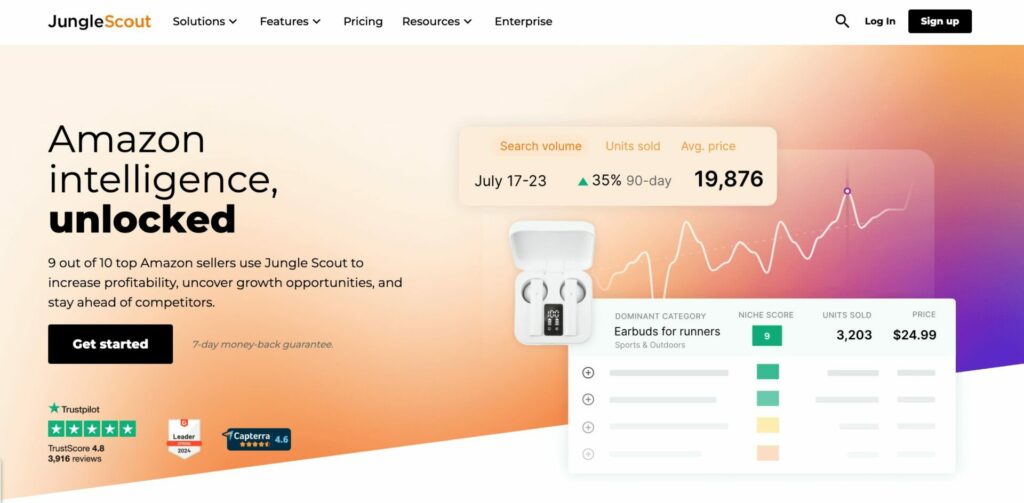
Jungle Scout is a leading toolset for Amazon sellers, offering a wide range of features for product research, market analysis, and sales tracking.
It is designed to help sellers find profitable products, optimize their listings, and monitor their performance on Amazon. Jungle Scout provides valuable insights and data to make informed decisions, making it a popular choice for both new and experienced Amazon sellers.
Unique Features:
- Product Database: Extensive database for finding profitable product opportunities.
- Keyword Scout: Advanced keyword research tool for optimizing product listings.
- Sales Analytics: Detailed sales tracking and analytics for performance monitoring.
- Supplier Database: Access to a vast database of suppliers for sourcing products.
- Opportunity Finder: Identify niche markets and high-demand product categories.
- Listing Builder: Tools to create and optimize product listings for better visibility.
- Chrome Extension: Browser extension for on-the-go product research and analysis.
Pros:
- Comprehensive Research Tools: Wide range of tools for product and market research.
- Data-Driven Insights: Valuable data and analytics for informed decision-making.
- User-Friendly Interface: Intuitive and easy-to-use tools.
- Strong Community Support: Active community and resources for Amazon sellers.
Cons:
- Cost: Subscription fees can be high, especially for advanced plans.
- Amazon Focused: Primarily designed for Amazon sellers, limited use for other platforms.
- Learning Curve: Some features may require time to learn and utilize effectively.
- Data Accuracy: Relies heavily on the accuracy of Amazon data.
Who Should Use This Software: Jungle Scout is ideal for Amazon sellers looking to find profitable products, optimize their listings, and track their sales performance. It suits both new and experienced sellers who need comprehensive tools and data-driven insights to grow their Amazon business.
Pricing: Jungle Scout offers a Basic plan starting at $119 per month, Suite plan at $149 per month, and Professional plan at $449 per month.
Editors Verdict: Jungle Scout’s Supplier Database is a unique feature that provides access to a vast network of suppliers, helping sellers source products more efficiently and effectively.
18. My Marketplace Builder

My Marketplace Builder is a customizable multivendor marketplace platform that allows users to create and manage online marketplaces for products, services, or rentals. It provides a user-friendly interface and a wide range of features to support vendor management, product listings, and customer interactions.
My Marketplace Builder is designed to be flexible and scalable, making it suitable for various business models and industries.
Unique Features:
- Customizable Templates: Wide range of customizable templates to match different business needs.
- Vendor Management: Comprehensive tools for onboarding and managing vendors.
- Integrated Payment Gateways: Supports multiple payment gateways for secure transactions.
- Advanced Search Functionality: Powerful search and filtering options for easy product discovery.
- Review and Rating System: Customers can leave reviews and ratings for vendors and products.
- Mobile Optimization: Fully responsive design for optimal performance on mobile devices.
- Subscription Plans: Ability to create and manage subscription plans for vendors with varying features.
Pros:
- User-Friendly: Intuitive interface that is easy to navigate and manage.
- Customizable: Highly customizable to fit specific business requirements.
- Scalable: Suitable for businesses of all sizes, from startups to large enterprises.
- Comprehensive Support: Offers strong customer support and resources.
Cons:
- Cost: Customizable features and scalability come at a higher price point.
- Learning Curve: Some features may require time to learn and master.
- Dependence on Customization: Extensive customization may require developer assistance.
- Performance: Can be resource-intensive, impacting site speed without proper optimization.
Who Should Use This Software: My Marketplace Builder is ideal for entrepreneurs and businesses looking to create a customizable and scalable multivendor marketplace for products, services, or rentals. It suits those who need a flexible platform that can be tailored to their specific business model.
Pricing: Pricing for My Marketplace Builder starts at $139 per month for the Standard plan, with custom pricing available for more advanced features and larger businesses.
Editors Verdict: My Marketplace Builder’s advanced search functionality is particularly notable, offering powerful search and filtering options that enhance the user experience and make product discovery easier for customers.
19. Omnyfy

Omnyfy is a multivendor marketplace platform designed to support various marketplace models, including product, service, and booking marketplaces.
It provides a comprehensive suite of tools for vendor management, product listings, order management, and customer interactions. Omnyfy is known for its ability to integrate with existing systems, making it a suitable choice for businesses looking to create customized and scalable marketplaces.
Unique Features:
- Marketplace Types: Supports product, service, and booking marketplaces.
- Vendor Onboarding: Streamlined vendor onboarding process with automated workflows.
- Customizable Templates: Wide range of customizable templates to suit different business needs.
- Integrated Payments: Built-in payment processing with support for various gateways.
- Advanced Analytics: Detailed analytics and reporting tools for tracking performance.
- API Integration: Extensive API support for custom integrations and functionality.
- Multi-Language and Multi-Currency: Supports internationalization with multi-language and multi-currency options.
Pros:
- Versatile: Suitable for various marketplace models, including product, service, and booking.
- Customizable: Highly customizable to fit specific business requirements.
- Scalable: Designed to handle growth and large-scale operations.
- User-Friendly Interface: Intuitive and easy-to-navigate dashboard.
Cons:
- Complex Setup: Initial setup can be challenging for non-technical users.
- Cost: Higher pricing may be prohibitive for small businesses.
- Customization Limitations: Some advanced customizations may require developer assistance.
- Performance: May require optimization to handle very high traffic volumes.
Who Should Use This Software: Omnyfy is ideal for businesses looking to create a versatile and scalable multivendor marketplace for products, services, or bookings. It suits medium to large businesses that require a flexible platform with robust features and integration capabilities.
Pricing: Omnyfy offers customized pricing based on the specific needs and scale of the business. Interested parties should contact Omnyfy for a personalized quote.
Editors Verdict: Omnyfy’s support for multiple marketplace models, including product, service, and booking marketplaces, makes it a uniquely versatile solution that can cater to a wide range of business needs.
20. SellerChamp
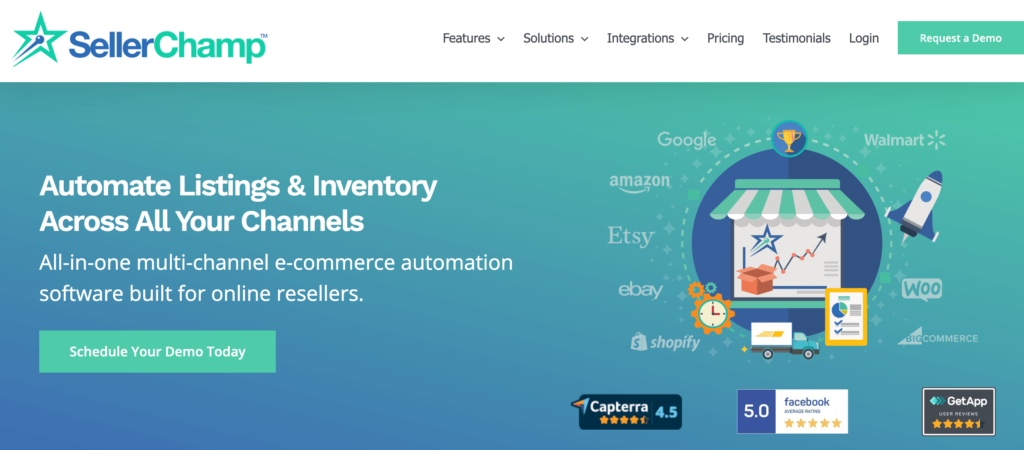
SellerChamp is an eCommerce automation platform designed to simplify and streamline the process of listing, managing, and selling products across multiple marketplaces.
It provides tools for bulk product uploads, inventory management, order processing, and shipping. SellerChamp is known for its integration capabilities, allowing sellers to connect with various online marketplaces and streamline their operations.
Unique Features:
- Bulk Product Uploads: Quickly list products in bulk across multiple marketplaces.
- Inventory Synchronization: Sync inventory levels across all connected marketplaces.
- Order Management: Centralized order management system for processing and fulfilling orders.
- Multi-Channel Support: Supports integration with various marketplaces, including Amazon, eBay, and Walmart.
- Automated Repricing: Dynamic repricing tools to stay competitive in the market.
- Shipping Management: Integrated shipping solutions for easy label printing and tracking.
- Analytics and Reporting: Detailed analytics and reporting tools for tracking sales and performance.
Pros:
- Time-Saving: Automates many aspects of eCommerce, saving time and effort.
- Multi-Channel Integration: Supports a wide range of marketplaces for expanded reach.
- User-Friendly: Intuitive interface that is easy to navigate and manage.
- Comprehensive Features: Offers a wide range of tools for managing all aspects of eCommerce.
Cons:
- Cost: Subscription fees can be high, especially for larger sellers.
- Learning Curve: Some features may require time to learn and utilize effectively.
- Dependence on Integrations: Success depends on seamless integration with marketplaces.
- Customer Support: Some users report delays in customer support response times.
Who Should Use This Software: SellerChamp is ideal for online sellers looking to automate and streamline their operations across multiple marketplaces. It suits both small and large businesses that need a comprehensive solution for managing listings, inventory, orders, and shipping.
Pricing: SellerChamp offers customized pricing based on the specific needs and scale of the business.
Editors Verdict: SellerChamp’s bulk product upload feature significantly reduces the time and effort required to list products across multiple marketplaces, making it a valuable tool for high-volume sellers.
21. Zielcommerce
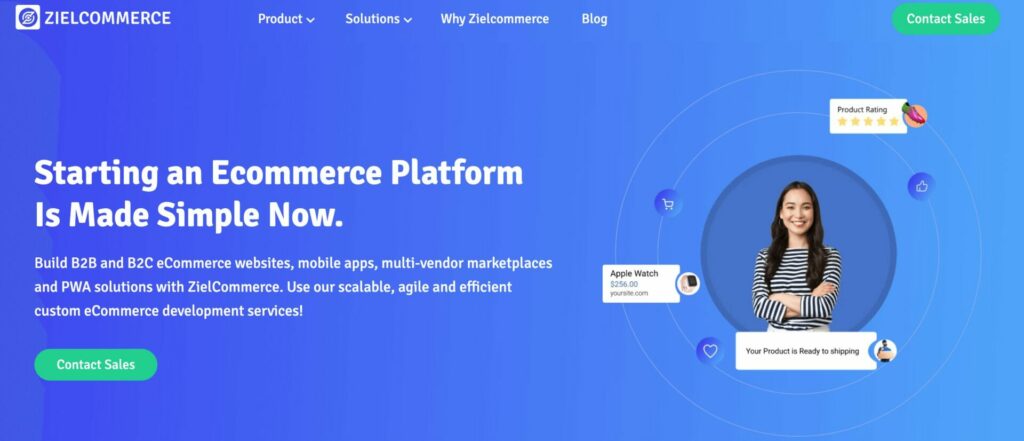
Zielcommerce is a turnkey eCommerce and marketplace solution that allows businesses to create and manage their own online stores or multivendor marketplaces.
It offers a wide range of features for vendor management, product listings, order processing, and customer engagement. Zielcommerce is designed to be user-friendly and customizable, making it suitable for various business models and industries.
Unique Features:
- Turnkey Solution: Ready-to-launch platform with all essential eCommerce features.
- Vendor Management: Comprehensive tools for onboarding and managing vendors.
- MultiVendor Support: Supports multiple vendors with individual dashboards.
- Integrated Payments: Supports various payment gateways for secure transactions.
- SEO Optimization: Built-in SEO tools to enhance search engine visibility.
- Mobile Optimization: Fully responsive design for optimal performance on mobile devices.
- Customizable Themes: Wide range of customizable themes to match different business needs.
Pros:
- User-Friendly: Intuitive interface that is easy to navigate and manage.
- Comprehensive Features: Offers all essential tools for running an eCommerce or marketplace site.
- Scalable: Suitable for businesses of all sizes, from startups to large enterprises.
- Strong Security: Advanced security measures to protect data and transactions.
Cons:
- Cost: Higher pricing may be prohibitive for small businesses.
- Learning Curve: Some features may require time to learn and master.
- Customization Limits: Extensive customization may require developer assistance.
- Performance: Can be resource-intensive, affecting site speed without proper optimization.
Who Should Use This Software: Zielcommerce is ideal for businesses looking to create a turnkey eCommerce or multivendor marketplace solution. It suits entrepreneurs and companies that need a ready-to-launch platform with comprehensive features and customization options.
Pricing: Zielcommerce offers custom pricing available for more advanced features and larger businesses.
Editors Verdict: Zielcommerce’s turnkey nature allows businesses to launch their online store or marketplace quickly, with all essential features included, making it a great option for those looking to get started without extensive development time.
22. Algolia

Algolia is a powerful search and discovery API for creating fast and relevant search experiences in eCommerce, media, and SaaS applications.
It provides tools for implementing high-performance search functionality, including instant search results, typo tolerance, and dynamic filtering. Algolia is known for its speed, relevance, and ease of integration, making it a popular choice for businesses looking to enhance their search capabilities.
Unique Features:
- Instant Search: Provides real-time search results with instant response times.
- Typo Tolerance: Advanced typo tolerance to handle misspelled search queries.
- Dynamic Filtering: Supports dynamic filtering and faceting for refined search results.
- Geo-Search: Geo-location based search for location-specific results.
- Multi-Index Search: Search across multiple indexes for comprehensive results.
- Personalization: Customizable search results based on user behavior and preferences.
- Analytics: Detailed search analytics and insights for performance tracking.
Pros:
- Speed: Extremely fast search response times enhance user experience.
- Relevance: Advanced algorithms ensure highly relevant search results.
- Ease of Integration: Simple API integration with various platforms and frameworks.
- Scalability: Handles high volumes of search queries efficiently.
Cons:
- Cost: Higher pricing may be prohibitive for small businesses.
- Learning Curve: Requires some technical knowledge to implement and optimize.
- Dependence on Internet Speed: Performance can be affected by the user’s internet speed.
- Customization Complexity: Advanced customizations may require developer assistance.
Who Should Use This Software: Algolia is ideal for businesses looking to implement fast and relevant search functionality in their eCommerce sites, media platforms, or SaaS applications. It suits medium to large businesses that need high-performance search capabilities and are comfortable with API integration.
Pricing: Algolia offers a free plan with limited features. It also offers custom pricing available for larger businesses and advanced features.
Editors Verdict: Algolia’s geo-search feature allows businesses to provide location-specific search results, enhancing the user experience for geographically dispersed audiences.
23. Auction Software
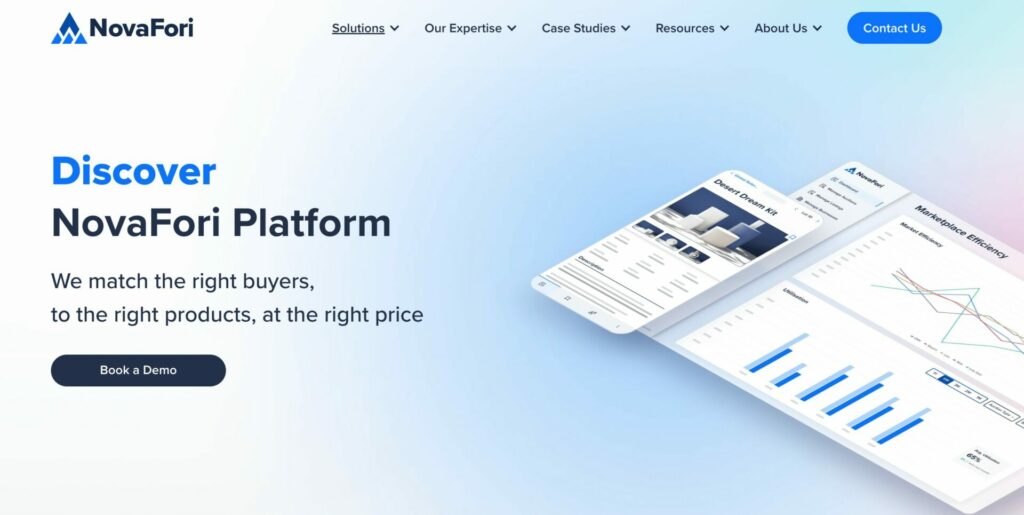
Auction Software is a platform that provides comprehensive tools for creating and managing online auctions. It supports various auction types, including live, silent, and proxy bidding, making it suitable for a wide range of auction-based businesses.
The software includes features for listing management, bid tracking, payment processing, and analytics. Auction Software is designed to be flexible and customizable, catering to different auction models and industries.
Unique Features:
- Multiple Auction Types: Supports live, silent, and proxy bidding auctions.
- Real-Time Bidding: Provides real-time bidding functionality for live auctions.
- Bid Management: Advanced tools for tracking and managing bids.
- Integrated Payments: Secure payment processing with multiple payment gateway options.
- Customizable Templates: Customizable auction templates to match different business needs.
- Reporting and Analytics: Detailed reporting and analytics tools for tracking auction performance.
- Mobile Optimization: Fully responsive design for optimal performance on mobile devices.
Pros:
- Versatile: Supports a wide range of auction types and business models.
- User-Friendly: Intuitive interface that is easy to navigate and manage.
- Comprehensive Features: Offers all essential tools for managing online auctions.
- Scalable: Suitable for businesses of all sizes, from small startups to large enterprises.
Cons:
- Cost: Higher pricing may be prohibitive for small businesses.
- Learning Curve: Some features may require time to learn and master.
- Customization Limits: Extensive customization may require developer assistance.
- Performance: Can be resource-intensive, affecting site speed without proper optimization.
Who Should Use This Software: Auction Software is ideal for businesses and organizations looking to create and manage online auctions. It suits a wide range of industries, including collectibles, real estate, and charity auctions, providing versatile tools to meet different needs.
Pricing: Auction Software offers custom pricing based on the specific needs and scale of the business. Interested parties should contact Auction Software for a personalized quote.
Editors Verdict: Auction Software’s real-time bidding functionality enhances the excitement and engagement of live auctions, providing a dynamic and interactive experience for bidders.
24. ChannelEngine
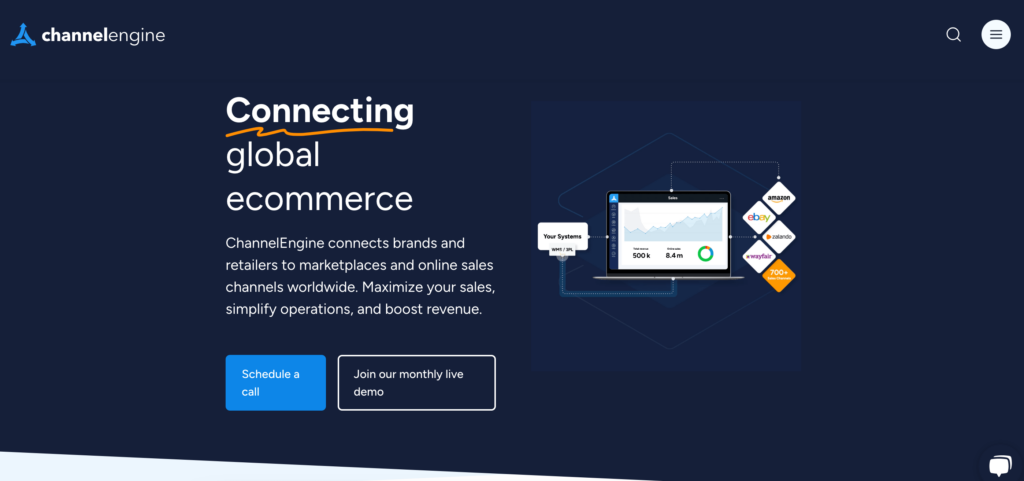
ChannelEngine is a powerful eCommerce platform designed to help businesses automate and optimize their sales across multiple online marketplaces. It provides tools for product listing, inventory management, order processing, and pricing optimization.
ChannelEngine is known for its seamless integration capabilities, allowing sellers to connect with various marketplaces and streamline their operations to maximize sales and efficiency.
Unique Features:
- Multi-Channel Integration: Supports integration with a wide range of marketplaces and eCommerce platforms.
- Automated Listing: Automates product listing and synchronization across multiple channels.
- Inventory Management: Centralized inventory management with real-time updates.
- Order Processing: Streamlined order processing and fulfillment.
- Dynamic Pricing: Automated pricing optimization to stay competitive.
- Analytics and Reporting: Detailed analytics and reporting tools for performance tracking.
- APIs and Connectors: Extensive APIs and connectors for custom integrations.
Pros:
- Time-Saving: Automates many aspects of multi-channel selling, saving time and effort.
- Wide Reach: Expands sales reach by connecting with various marketplaces.
- User-Friendly: Intuitive interface that is easy to navigate and manage.
- Comprehensive Features: Offers a wide range of tools for managing all aspects of eCommerce.
Cons:
- Cost: Subscription fees can be high, especially for larger sellers.
- Learning Curve: Some features may require time to learn and utilize effectively.
- Dependence on Integrations: Success depends on seamless integration with marketplaces.
- Customer Support: Some users report delays in customer support response times.
Who Should Use This Software: ChannelEngine is ideal for online sellers looking to automate and optimize their multi-channel sales operations. It suits both small and large businesses that need a comprehensive solution for managing listings, inventory, orders, and pricing across multiple marketplaces.
Pricing: ChannelEngine offers custom pricing based on the specific needs and scale of the business. Interested parties should contact ChannelEngine for a personalized quote.
Editors Verdict: ChannelEngine’s dynamic pricing feature helps sellers stay competitive by automatically adjusting prices based on market trends and competitor pricing, maximizing sales potential.
25. Vendasta
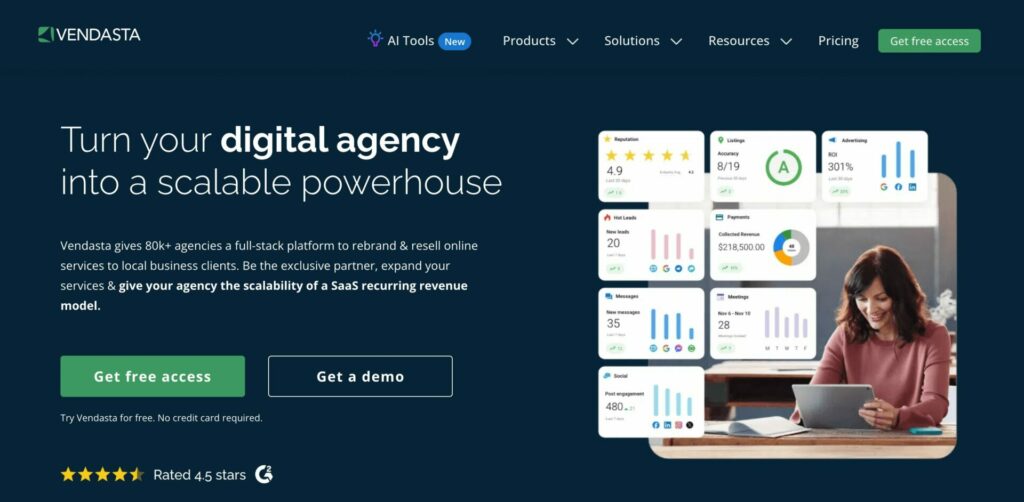
Vendasta is a comprehensive platform designed to help businesses sell digital solutions and services. It provides a suite of tools for managing customer relationships, marketing automation, eCommerce, and fulfillment.
Vendasta is known for its white-label capabilities, allowing businesses to brand the platform as their own and offer a wide range of digital products and services to their clients.
Unique Features:
- White-Label Solutions: Allows businesses to rebrand the platform and offer it under their own brand.
- Digital Products Marketplace: Access to a wide range of digital products and services.
- CRM Integration: Integrated CRM for managing customer relationships.
- Marketing Automation: Tools for automating marketing campaigns and activities.
- eCommerce Platform: Supports the sale of digital products and services.
- Fulfillment Services: Comprehensive fulfillment services for digital products.
- Client Reporting: Detailed reporting tools for tracking client performance and engagement.
Pros:
- Versatile: Supports a wide range of digital products and services.
- User-Friendly: Intuitive interface that is easy to navigate and manage.
- Comprehensive Features: Offers all essential tools for selling and managing digital solutions.
- Scalable: Suitable for businesses of all sizes, from small startups to large enterprises.
Cons:
- Cost: Higher pricing may be prohibitive for small businesses.
- Learning Curve: Some features may require time to learn and master.
- Customization Limits: Extensive customization may require developer assistance.
- Dependence on Vendor Partnerships: Success depends on strong vendor partnerships for digital products.
Who Should Use This Software: Vendasta is ideal for businesses looking to sell digital solutions and services under their own brand. It suits marketing agencies, IT service providers, and other companies that want to offer a wide range of digital products to their clients.
Pricing: Vendasta’s pricing plans range from $79 per month for the Startup plan to $1,500 per month for the Scale plan.
Editors Verdict: Vendasta’s white-label capabilities allow businesses to create a unique brand experience for their clients, enhancing their market presence and credibility.
26. Bagisto
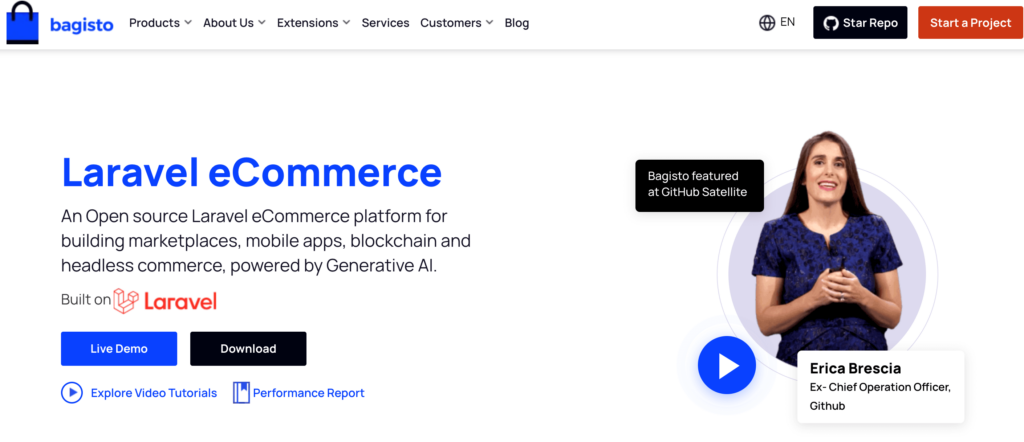
Bagisto is an open-source eCommerce framework built on Laravel, designed to provide a robust and flexible platform for online stores and marketplaces.
It offers a wide range of features for product management, order processing, inventory control, and customer engagement. Bagisto is known for its scalability and customization options, making it suitable for businesses of all sizes and industries.
Unique Features:
- Open-Source: Free to use and highly customizable with access to the source code.
- Laravel Framework: Built on Laravel, providing a robust and modern development environment.
- MultiVendor Marketplace: Supports the creation of multivendor marketplaces.
- Product Management: Comprehensive tools for managing product listings and categories.
- Inventory Control: Advanced inventory management with real-time updates.
- SEO Optimization: Built-in SEO tools to enhance search engine visibility.
- Multi-Language and Multi-Currency: Supports internationalization with multi-language and multi-currency options.
Pros:
- Cost-Effective: Free to use with no licensing fees.
- Customizable: Highly customizable with a wide range of features and extensions.
- Scalable: Suitable for businesses of all sizes, from small startups to large enterprises.
- Active Community: Strong community support and resources for developers.
Cons:
- Technical Knowledge Required: Requires a certain level of technical expertise to set up and manage.
- Performance: Can be resource-intensive, affecting site speed if not optimized.
- Security: Open-source nature may require additional security measures.
- Dependence on Extensions: Some advanced features require additional paid extensions.
Who Should Use This Software: Bagisto is ideal for businesses looking for a flexible and customizable open-source eCommerce platform. It suits small to medium-sized businesses that need a robust framework for creating online stores or marketplaces.
Pricing: Bagisto is free to use, but costs can add up with premium themes, extensions, and hosting.
Editors Verdict: Bagisto’s foundation on Laravel provides a modern and developer-friendly environment, making it an attractive choice for developers looking to build customized eCommerce solutions.

Subscribe to
Dokan blog
Read these guides to create different types of marketplaces-
- Raw Material Marketplace
- Watch Marketplace
- Online Furniture Marketplace
- Bike and Car Rental Marketplace
- Digital Products Marketplace
- Online Book Marketplace
- Online Cosmetics Marketplace
- Jewelry Ornaments Marketplace
- Marketplace Like Flipkart
- Botanical Products Marketplace.

Choose the Best Multivendor Marketplace Software to Start Your Business
The list of the best marketplace software maybe long, but it is necessary so that you choose the right one.
If you are looking for the all-around features, ease of use, flexibility, and scalability then you should go for the Dokan multivendor marketplace plugin. CS-Cart MultiVendor is suitable for medium to large businesses needing a scalable, feature-rich solution. Shopify is perfect for small to medium businesses that prioritize ease of use and quick deployment.
Read: Dokan Cloud vs Dokan Plugin
Magento is ideal for large enterprises with advanced customization needs and technical resources. BigCommerce is excellent for scalable, SEO-friendly marketplaces, particularly in the B2B sector.
So, choose according to your preferences and if you face any problems while choosing, then ask your questions in the comment box. We have 10 years of experience in the multivendor marketplace business.
Subscribe to
Dokan blog
We send weekly newsletters, no spam for sure!


